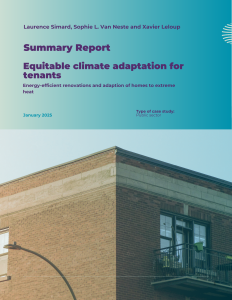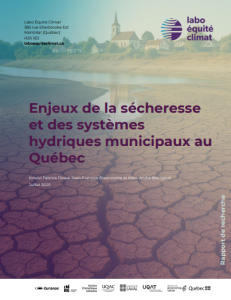Case studies
Tenant equity in climate policies
This report (in french) looks at how tenants are taken into account in Quebec in two areas of public climate policy intervention: those aimed at reducing GHG emissions from residential buildings, through decarbonization and energy efficiency, more specifically those involving building renovations, and those aimed at adaptation to oppressive heat. One of the main dilemmas encountered concerns who pays for housing transition, but also who benefits and who is left out. These include concerns about controlling rent increases following renovations, and the displacement of vulnerable groups. This research is being carried out in two phases: a documentary analysis of public climate policies and possible solutions (June 2023 to September 2024) and two focus groups with stakeholders from housing committees and the Logement en Transition group in Montreal (September 2024).
A summary of this report is also available in English:
Challenges of drought and municipal water systems in Quebec
This report (in French) aims to contribute to the development of knowledge on drought in Quebec. Based on a press review and an exploration of scientific and grey literature, the project used governmental and hydrological data to analyze the vulnerability of Quebec municipalities to drought, in relation to their drinking water supply systems. The results show that 63% of municipalities rely primarily on groundwater, which is often more sensitive to prolonged droughts. The municipalities most affected by drought generally depend on vulnerable groundwater supply systems, while those less impacted benefit from a diversity of sources (lakes, rivers, the St. Lawrence River), providing them with greater resilience. The combined analyses revealed a strong correlation between drought exposure levels and types of water supply. The study highlights the need for integrated management, diversification of sources, and targeted investments in high-risk areas to strengthen water security in the face of future climate challenges.


